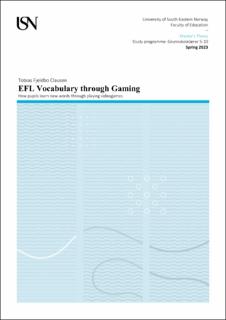| dc.contributor.advisor | Calafato, Raees | |
| dc.contributor.author | Clausen, Tobias Fjeldbo | |
| dc.date.accessioned | 2023-08-30T16:42:11Z | |
| dc.date.available | 2023-08-30T16:42:11Z | |
| dc.date.issued | 2023 | |
| dc.identifier | no.usn:wiseflow:6794235:55231531 | |
| dc.identifier.uri | https://hdl.handle.net/11250/3086487 | |
| dc.description.abstract | This study focused on finding correlations between playing different genres of videogames and their receptive and productive English vocabulary. It also delved into how the use of Metacognitive Learning Strategies impacted the students’ vocabulary. The study used a new scale for collecting information on the Metacognitive Learning Strategies used. Lastly it found connections to how gaming influenced the students’ habits of consuming and producing English media content.
This was a quantitative study done using a questionnaire with the participants being in 8th to 10th grade (n=116). The students were from one school in the south-east of Norway.
The aim of the study was to find out if gaming finding place outside of the classroom and school activities had a positive influence on the students’ English learning. With the new curriculum changing the focus of what is important to focus on in the English classroom today, this study tries to change the opinions on gaming as a valid learning method. It is important for students that their hobbies are validated by the adults around them, and by doing so there might be an increase in motivation. | |
| dc.description.abstract | | |
| dc.language | eng | |
| dc.publisher | University of South-Eastern Norway | |
| dc.title | EFL Vocabulary through Gaming: How pupils learn new words through playing videogames | |
| dc.type | Master thesis | |
